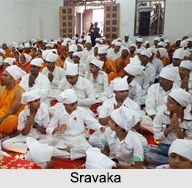 Sravaka is a pupil or disciple who listens to the sermons attentively. Since he has firm faith too, he is often called "Sadhaka" or "Upasaka". Lord Mahavira spoke highly about the laity as he noticed that some householders were even superior to ascetics in observing perfect restraint.
Sravaka is a pupil or disciple who listens to the sermons attentively. Since he has firm faith too, he is often called "Sadhaka" or "Upasaka". Lord Mahavira spoke highly about the laity as he noticed that some householders were even superior to ascetics in observing perfect restraint.
Qualities of Sravaka
In order to qualify as a Sravaka it is primarily necessary for a layman to have prerequisites like:
a. Firmness in conduct
b. Honesty in earning wealth
c. Morality and integrity in behavior
d. Fearlessness
e. Straightforwardness
f. Vigilance in the observation of self-control
g. Faith in the existence of the soul etc.
Types of Sravakas
Depending upon the practice of disciplinary rules the three types of Sravakas are:
1. Paksika Sravaka: He is a layman, who has faith in the religion and practices the 8 Mula gunas, 5 Anuvratas and avoidance of 3 Makaras.
2. Naisthika Sravaka: He is one who pursues the spiritual path upwards through the practice of Pratimas till he reaches the eleventh stage and ultimately becomes ascetic.
3. Sadhaka Sravaka: He is one who concludes (Sadhayati) his life by taking up the vow of Sallekhana, a Vrat for peaceful voluntary death.
Rules in Sravakacara
A Sravaka is supposed to observe certain rules of conduct are as follows:
1. Marganusari: Jain tradition describes moral rules for lay person relating to their day to day activities in family, business, society and nation. There are 35 rules, called "Marganusari", a path worth observing.
2. Twelve Vratas: These vows are a form of self-discipline and are helpful in the practice of right conduct. They help to avoid influx of karmas and are said to make one"s life peaceful and happy.
3. Four Bhavanas: These four contemplations or Bhavnas are vital for our practical life to avoid mental violence. Along with the said vows a Sravaka should also cultivate four qualities, are:
a. Maitri Bhavana - feeling of friendliness
b. Pramoda Bhavana - feeling of gladness
c. Karuna Bhavana - feeling of compassion
d. Madhyasta Bhavana - feeling of neutrality
4. Three Makaras: One needs to keep away from
a. Madira (Wine)
b. Mamsa (Meat)
c. Madha (Honey)
5. Seven Vyasanas: The seven Vyasanas or addictions that may lead to ruining of one"s life according to Jainism also need to be avoided, are:
i. Mamsa - Meat
ii. Madya - Wine
iii. Dyuta - Gambling
iv.Caurya - Theft
v. Vesya - Prostitution
vi. Para Dara - Adultery
vii. Paparddhi - Sport or Hunt
6. Six Avasyakas: Daily Duties or Nityakarma performed by Sravaka keeps him on path of spiritual journey.
i. Deva Puja - Worship to Gods
ii. Gurupasti - Worship to Preceptor
iii. Swadhyay - Study of Scripture
iv. Samyam - Practice of self-control
v. Tapa - Penance
vi. Dana - Donation
7. Eleven Pratimas: A Sravaka needs to observe the 11 Pratimas, special types of austerities, for spiritual progress for ultimate purification. These are the step towards preparation of monkhood.




















